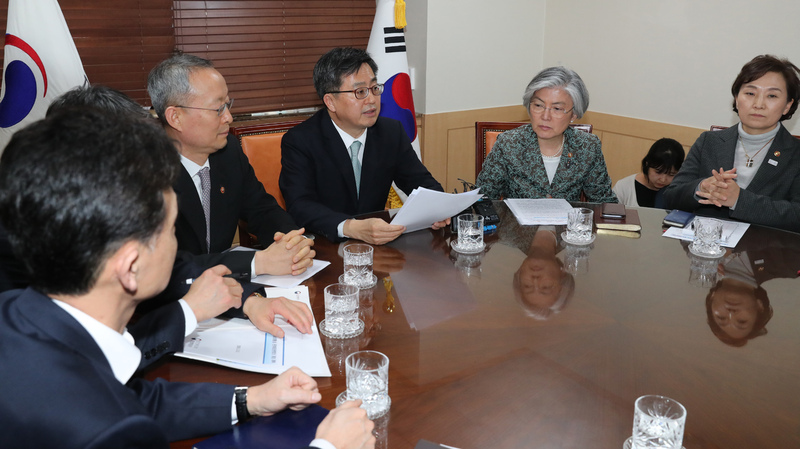 |
|
South Korean Deputy Prime Minister and Minister of Strategy and Planning Kim Dong-yeon presides over an emergency meeting to discuss a joint response by South Korean ministries to the Trump administration’s imposition of tariffs on steel and aluminum. From left are Trade Minister Kim Hyun-chong, Minister of Trade, Industry, and Energy Paik Un-gyu, Kim, Foreign Minister Kang Kyung-wha, and Minister of Land, Transportation, and Infrastructure Kim Hyun-mee. (by Kim Chang-kwang, staff photographer)
|
The Moon administration will work toward exemptions for South Korean products
The South Korean government has decided on a response plan of “fighting to the end” to exclude South Korean steel from an across-the-board 25% tariff announced by US President Donald Trump, while examining the possibility of the measures being in violation of World Trade Organization (WTO) norms. Trump’s measures have triggered a strong backlash from the international community, with the EU, China, and Canada announcing their own retaliatory tariff response. Seoul avoided reference to “tariff retaliation” or cooperation with the international community in response to the onslaught of “America first” protectionist measures by Trump. Analysts said the decision to pursue the somewhat mild approach of “working to exclude South Korean steel” – after President Moon Jae-in’s previous calls for a “bold and resolute response” – was based on the realistic conclusion that the national interest would be best served by minimizing frictions in the trade war between major trading powers. South Korean Deputy Prime Minister and Minister of Strategy and Planning Kim Dong-yeon called an emergency meeting of external trade relations ministers on the afternoon of May 5 to discuss a joint response by related agencies to the “global trade war” over steel. Trade Minister Kim Hyun-chong, who has been in Washington since Feb. 25 as part of a steel “outreach” effort to enlist stakeholder support, briefly returned to South Korea to attend the briefing. Kim is set to depart for Washington again on Mar. 6 to continue his persuasive efforts with the White House. “We are taking the external trade situation very seriously, including the possibility of global trade fictions growing,” Kim said at the first pan-governmental trade countermeasures meeting since the US Commerce Department released its recommendations for steel import regulations on Feb. 16. “As a first step, we plan to fully explain our position to the US and contact Congress, state governments, and business groups as we redouble our persuasive efforts,” he continued, adding that he planned to explain the South Korean position in bilateral talks with the US and other major economies at the G20 Finance Ministers’ Meeting later this month. Seoul has decided on a response plan of focusing last-minute efforts on having South Korean steel excluded from the tariff targets before Trump makes a final decision. Retaliatory tariffs are not currently under consideration “Almost no reference was made at today’s meeting to retaliatory tariffs against US products or coordination with other countries as potential South Korean response plans,” a senior Ministry of Trade, Industry and Energy (MOTIE) source said. Seoul’s stance is relatively mild compared to the stern response of retaliatory tariffs from the EU and China. “The trade game is one in which you need to play effective and powerful cards of pressure and retaliation to get the other side to withdraw or amend their trade regulations,” explained a senior trade official. “At the same time, we’re a country that relies on exports, and we can’t really attempt retaliatory regulations against US imports because of the possibility we could face heavier retaliation from the US,” the official said. Some of South Korea’s potential response measures to US trade pressures including complaining to the WTO and suspending concessions (i.e, tariff abolition and reduction benefits for existing imports) and ramping up anti-dumping investigations on goods imported from the US. In 2013, Seoul responded to the US’s failure to roll back anti-dumping tariffs on South Korean washing machines – even after South Korea’s victory before a WTO dispute panel – by adopting a response policy of suspending concessions. The government has also resorted to the WTO complaint card over washing machine safeguard measures adopted this past January. But some observers are questioning the benefits of relying on the WTO agreement framework, noting that disputes typically take years to resolve and the parties involved may refuse to comply with the decision when it comes. A senior Blue House official said on Feb. 20 that Seoul was “taking the maximum route in what we can realistically do in terms of law and procedure.” “It’s not true that there is nothing to be gained [from a WTO complaint], because we can implement tariff suspensions and other retaliatory tariffs if the US fails to implement a tariff rollback or other follow-up measures,” the official argued. The claim is that Seoul can use the complaint approach to gain an opportunity for bilateral negotiations with the US, where it would serve as key leverage. Responding to the controversy surrounding the high across-the-board tariffs the Trump administration plans to apply to imported steel and aluminum, Commerce Secretary Wilbur Ross said on Mar. 4 that there would be no exemptions for particular countries. It’s a signal that Washington is pushing ahead “Trump-style” against a flood of requests for exemptions from the high rates and arguments that South Korea and other allies should be granted exemptions. By Cho Kye-wan, staff reporter Please direct questions or comments to [english@hani.co.kr]






